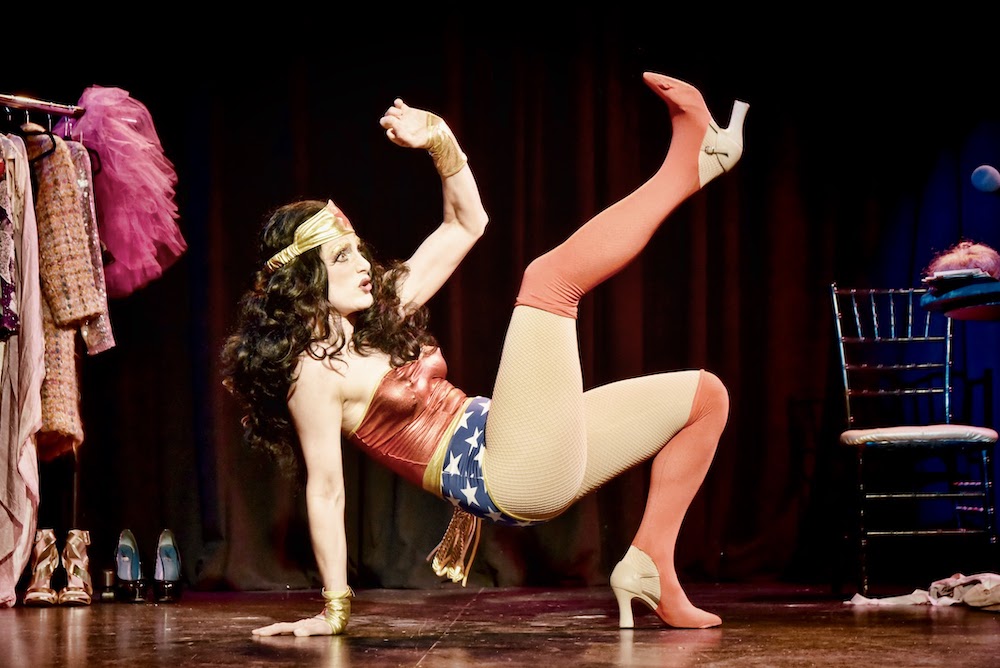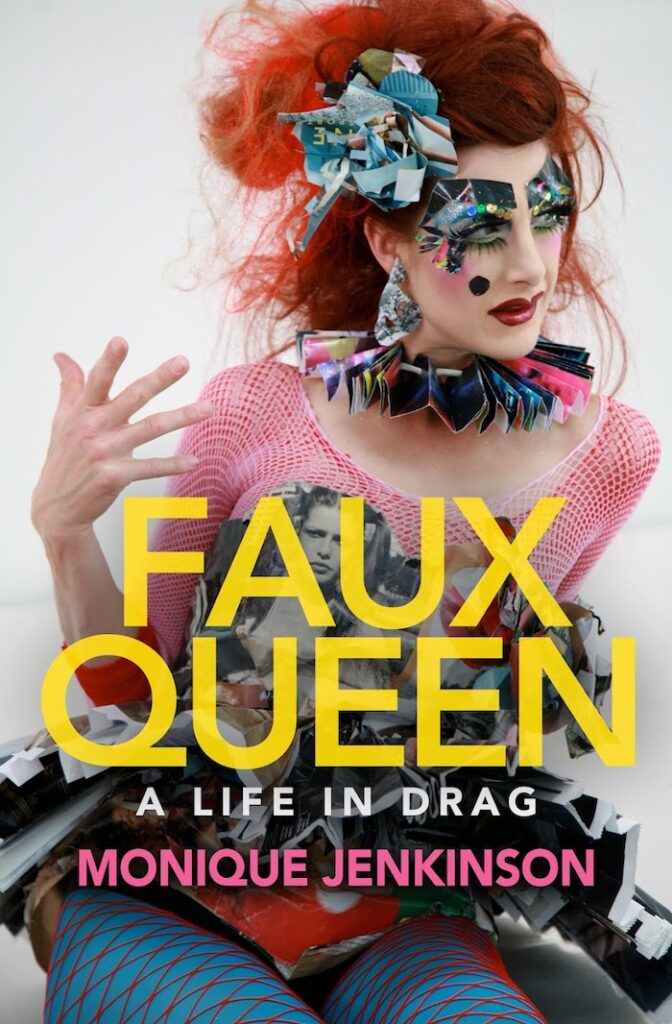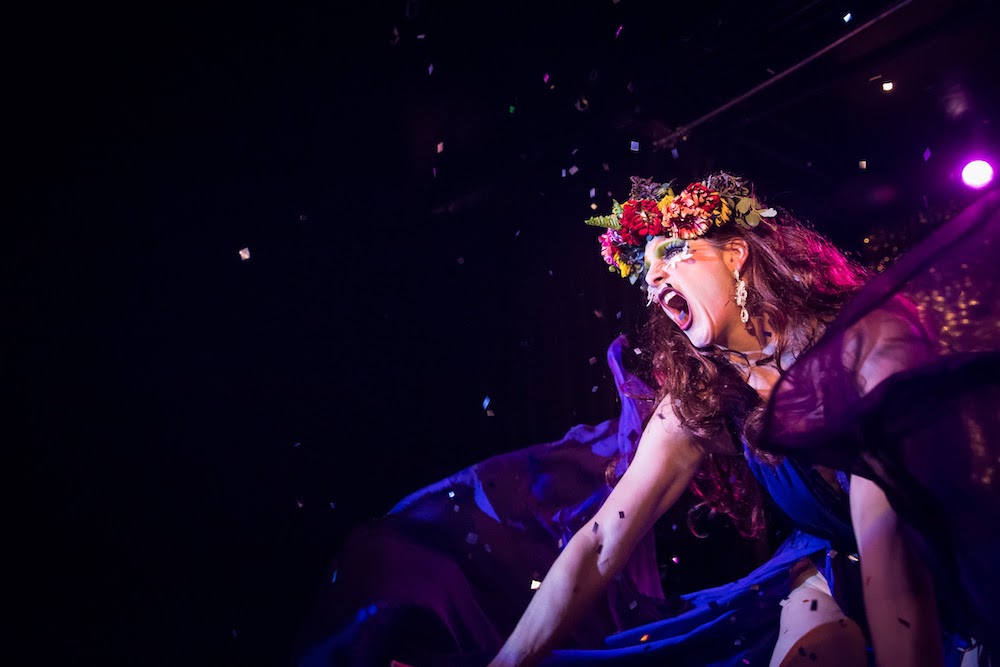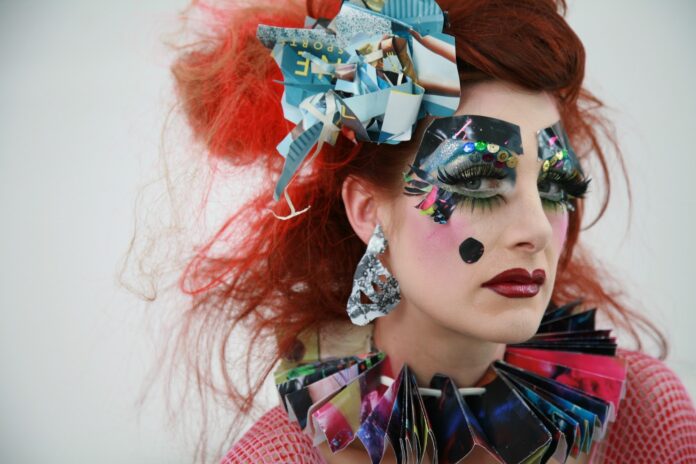It’s no secret that in this sexist world, women have to work twice as hard as men just to stay at their heels. Even when said men are wearing wigs, fake eyelashes, and actual heels.
Monique Jenkinson learned this very lesson when she stepped into her drag persona, Fauxnique, at Trannyshack, Heklina’s one-time Tuesday-night drag show at The Stud. Or when she fought to break ground and shatter ceilings by becoming the first cisgender woman crowned as a pageant-winning drag queen at Miss Trannyshack 2003.
This win cannot be underestimated—even in 2022—as talk show host and producer Andy Cohen made clear on a recent episode of Bravo’s Watch What Happens Live. While interviewing RuPaul’s Drag Race alum Shangela, Cohen just couldn’t wrap his head around the inclusion of cisgender woman Victoria Scone on the British edition of the popular drag competition franchise—a full 18 years after Fauxnique won her coveted title.
“How is a female being a drag queen?” the talk show host asked, 24 years after Ana Matronic became the first cisgender woman to reach the finals of the annual Trannyshack competition in 1997. “It doesn’t matter about your gender, it is about your show,” Shangela responded. And Fauxnique can certainly put on a show.
But the classically trained dancer didn’t get into step right out of the box—femme queens didn’t come with instruction manuals when she started out. There was no RuPaul’s Drag Race, Drag Brunch, and Drag Queen Story Hour to show her the way. So she relied on drag mothers like Juanita More! and Glamamore, who would become her lifelong friends.
Her new book, Faux Queen: a Life in Drag, chronicles her journey from a suburban ballet-obsessed misfit in the ‘70s and ‘80s to a rising star in San Francisco’s alternative drag scene in the ‘90s, to drag royalty and acclaimed performance artist in the ‘00s. But underneath the artifice of the wigs, the lashes, the makeup, and the heels, the book is really about the deep self-discoveries, friendships, and feminism that Jenkinson uncovered along the way.
As Mr. David (a.k.a. Glamamore) told Fauxnique after she won Miss Trannyshack: “This is the most feminist thing you’ve ever done.”

I spoke to the performance artist—set to celebrate the release of her new book at Oasis on Sat/19 with her own “drag queen story hour”—about being a woman in a man’s world, proving herself as a faux queen and feminist, and the five words every aspiring drag performer should know.
48 HILLS For those who weren’t there, how was the particular era of San Francisco nightlife and drag life that you cover in your book different from today?
MONIQUE JENKINSON It was more permissive and wilder in a lot of ways. The club I came up in was a product of punks, art nerds, and club kids who were already rejecting the mainstreaming of drag. This had to do with the era, but also the place. As lawless as it was, it was a safe space for queers. We didn’t have makeup tutorials or social media, so teaching and learning about makeup, for instance, happened in the creative community in person. Also, what happened at the club tended to stay at the club. We had video, but we couldn’t share it instantly.
48 HILLS If you had to nail it down in a couple of sentences, what was it about drag and becoming a drag performer that appealed to you?
MONIQUE JENKINSON The first time I saw myself in false eyelashes at the age of 15, I knew the aesthetics and practices were for me, but I didn’t know what the culture would be. The aesthetics and practices appealed to me, but once I became a drag performer, it was the friendships and the rigor and regularity of the performance practice that held me.

48 HILLS Why do you think you won Miss Trannyshack 2003? Did you understand the significance at the time of being the first cisgender woman to win the honor?
MONIQUE JENKINSON My performance just really landed with the audience and the judges. I didn’t expect to win, but the response was astounding—an intense, transformative energy. I think I did and didn’t understand the significance. That audience energy felt like a deep magical expansion and connection to a community that was already mine. It just felt right, but I also think I needed a little bit of perspective to see the bigger significance. I think making a big win in a “man’s world” is very feminist. But reclaiming feminine performance on my own terms and being validated for it by a big club full of loving fans, most of them gay men, is my idea of feminism.
48 HILLS You use a lot of drag terminology in your book. What are the five words you think every aspiring faux queen should know?
MONIQUE JENKINSON Kiki: Deep, real talk. Preferably in-person. Good Judy: A friend with whom you might enjoy a kiki. Mary: A name you might call your Good Judy. Hat: A wig (according to the late, great Nikki Starr). Beat: As a noun (your completed state of made-up drag face—“Fierce beat, Mary!”) or verb (what you might do to your face or hat).
48 HILLS You also use words and speak to issues in the book that some may find controversial/triggering in 2022. Please explain that choice.
MONIQUE JENKINSON Well, there was really no way around using the language of the time when writing a memoir. The name of the drag title I won, Miss Trannyshack, encompasses language we don’t use anymore, but the win and the club is really the genesis of my whole drag story, so in a way, it wasn’t even a choice. Or rather, to make a different choice would be to choose not to write about it at all. All the words I use, I try to use in context and explain that context.
I’m not making an argument that language doesn’t matter or that it should be a big free-for-all. Language does matter, and it matters to me. It is not for me to decide what to do with the t-word once and for all, but I have to use it in the context in which I encountered it in the time and place I’m rendering. To evade that would be disingenuous. I’ve tried to be kind and sensitive inside that process.

48 HILLS So many women have said to me over the years that they want to enter gay spaces but feel like they’d be trespassing. What would you tell them from your own experience to help them over this hurdle?
MONIQUE JENKINSON I was really invited into all of the gay (male, for the most part) spaces I entered, and welcomed once I was there, so I never had the feeling of trespassing, or if I did, it didn’t last long. I think it’s good to ask yourself what kind of energy you’re bringing to a space. I don’t feel like I belong in every single gay space I enter, and I don’t tend to stick around long in the ones where I don’t feel like I belong. Go with friends who are already at home there or try to make some once you’re there. If it seems like the kind of place where it’s easy to make friends, it’s probably your space, too. You’ll know. Go where it’s warm.
48 HILLS Can you speak about the ways that women in the ’90s and ’00s (yourself included) helped feminism along so that young people today can better understand Gen-X’s contribution to the fight for equality?
MONIQUE JENKINSON I do think Gen X feminists did a lot to tease apart and reconfigure sexuality, agency, and femininity. I don’t necessarily believe in the strict separation of the “waves” of feminism, but we were questioning the rules made by the “second wave.” Rules like: high heels are tools of the patriarchy. We did a lot of reclaiming things like lipstick and heels. With that, we also continued the good groundwork of the second wave with things like “take back the night,” the idea that you should be able to walk around safely whenever you want and wear whatever you want. That you could be a feminist making punk music or art about knitting and that those modes could be equally valuable to the culture.
48 HILLS You say in the book that the narratives of women are often discounted. What inspired you to go against this belief and finally put out your own story? What do you hope readers take away from it?
MONIQUE JENKINSON It’s not a belief of mine that I will be discounted, but it can get really discouraging to see women’s stories, projects, and contributions sidelined and erased time and time again for all kinds of reasons. However, if you don’t contribute, you guarantee that your narrative won’t be heard. Lots of people told me that this is a story they want to hear. That really kept me going during the years it took to put it together, through the ups and downs and discouragements. I hope readers will find joy and depth. I hope people who were there at the clubs I write about will feel like they’re there again and people who weren’t will wish they were. I hope it will spark lively and complex conversation, which has already been the case. And I hope readers want to talk with me about it!
Faux Queen: a Life in Drag – Book Party, Sat/19, $10. Tickets and more info here.







